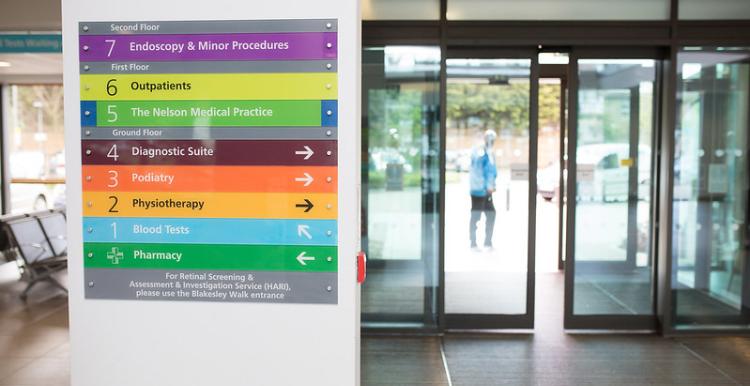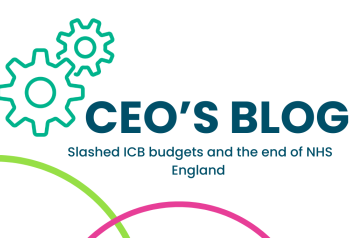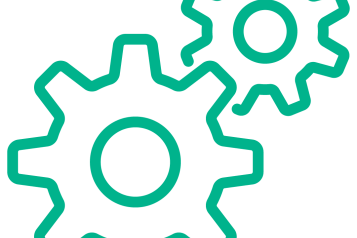Jargon buster for health and care services

This is your jargon buster for health and care services.
On this page we’ve listed the acronyms and phrases that we use the most on our website, and that you'll often come across when using NHS services.
We want to make our information easy to understand for everyone, whether you know lots about health and social care, or whether you know very little.
If you can’t find what you’re looking for here, please tell us. We will keep adding phrases, words and acronyms over time.
COMMON ACRONYMS
ICS – Integrated Care System
Statutory (set up by law) partnerships of organisations that come together to provide joined up health and care services in their local area. The organisations involved include the NHS, local authorities, voluntary and charity groups, and independent care providers.
ICP – Integrated Care Partnership
A statutory (set up by law) committee jointly formed between the NHS Integrated Care Board and the local authorities that fall within that ICS area. The ICP will bring together partners who all want to improve our care, health and wellbeing. The ICP is responsible for putting together a plan for how to meet the health and wellbeing needs of the population. The ICP for our ICS is the Bedfordshire, Luton and Milton Keynes Health and Care Partnership.
ICB – Integrated Care Board
A statutory (set up by law) NHS organisation responsible for developing a plan for meeting the health needs of the population, managing the NHS budget, plus arranging, buying and delivering health services in the ICS area. ICBs have replaced what was previously called ‘clinical commissioning groups’ (CCGs).
BLMK – Bedfordshire, Luton and Milton Keynes
MK – Milton Keynes
CQC – Care Quality Commission
The independent regulator of health and social care in England.
Visit their website to find out more.
NICE – National Institute for Health and Care Excellence.
An organisation that produces guidance, advice, and sets the standards that health, public health and social care have to meet.
Visit their website to find out more.
MKUH – Milton Keynes University Hospital
Visit their website to find out more.
A&E – Accident and Emergency
The department in a hospital that deals with serious injuries and life-threatening emergencies. It is also known as the emergency department or casualty.
CNWL – Central and North West London NHS Foundation Trust
Despite their name, this NHS Trust provide community health services to people living in Milton Keynes. This includes mental health services, district nursing, the 0-19 universal health services which includes school nursing, health visitors, addictions and substance misuse recovery services, and sexual health services.
Visit their website to find out more.
CCS – Cambridge Community Services
They run the iCaSH sexual health service in Milton Keynes.
Find out more on their website.
iCaSH - Integrated Contraception and Sexual Health services
HWE – Healthwatch England
The national organisation that acts on complaints and concerns about health and social care services which have been raised by local Healthwatch to CQC. CQC have to respond to any advice that Healthwatch England give them about health and care services.
Visit their website to find out more.
NHS – National Health Service
The health service in the UK.
Visit their website to find out more.
PCN – Primary Care Network
Groups of local doctors surgeries working together with community, mental health, social care, pharmacy, hospital and voluntary services in their local areas to provide more targeted support to their patients.
Find out more.
PPG – Patient Participation Group
VCFSE – Voluntary, Community, Faith and Social Enterprise Sector (also referred to as VCSE)
DHSC - Department for Health and Social Care
The UK Government department that runs health and social care.
Visit their website to find out more.
ASC – Adult Social Care
LGBTQIA+ - or you may see LGBTQ+
An acronym that indicates the spectrum of lesbian, gay, bisexual, transgender, queer, intersex, asexual + other people whose identities are not heterosexual and cisgender (see also below).
SEND - Special Educational Needs or Disabilities
Special educational needs and disabilities (SEND) can affect a child or young person’s ability to learn. They can affect their:
- Behaviour or ability to socialise, for example they struggle to make friends
- Reading and writing, for example because they have dyslexia
- Ability to understand things
- Concentration levels, for example because they have ADHD
- Physical ability.
ADHD - Attention Deficit Hyperactivity
A condition that affects people's behaviour. ADHD affects people differently; some people with ADHD can seem restless, may have trouble concentrating and may act on impulse. Many enjoy their creativity and positive energy.
COMMON PHRASES
Statutory - written in law, legally required.
Commission - a term used by the NHS that means arranging, buying and delivering health services.
Non-binary - refers to a spectrum of gender identities that are not exclusively masculine or exclusively feminine, i.e. identities that are outside the gender binary.
Cis/cisgender – a person whose sense of gender identity correlates with the sex that they were assigned at birth.
Trans/ Transgender - People whose gender identity differs from their sex assigned at birth
Safeguarding - Refers to measures to protect people, particularly those at risk, from abuse or harm.
Ethnic minority communities/minority ethnic communities - person or group of people from an ethnic group that is a minority in a particular context.
Community health services - Services that treat people with physical healthcare problems in their own homes, or close to home, where they will be more comfortable and can continue to live independently. For example: district nursing, school nursing, health visitors, addictions and substance misuse recovery services, and some sexual health services.
Neurodiverse/Neurodivergent/Neuroatypical - To describe somebody whose brain and cognition functions differently from what is considered ‘typical’.
You may also find the NHS Confederation website useful for understanding clinical abbreviations and acronyms that are less common, that you might come across in hospitals, doctors surgeries, or anywhere else you receive medical treatment .
Visit the NHS Confederation website

